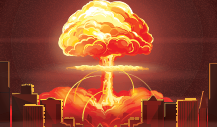FIVE ENERGY-RELATED DISASTERS OF MODERN TIMES
Producing energy to power is a dirty and dangerous business. Drilling for oil several miles below the surface of the sea involves lots of engineering challenges. Bringing up coal from deep underground puts miners’ lives at risk. Nuclear energy catastrophes, though rare, can lead to bad situations, unliveable zones. Below is a list of five massive disasters that were either a result of something gone terribly wrong during energy production, or that resulted in millions of people losing access to energy.
Fukushima (2011): March 11, 2011 tsunami was unprecedented in Japanese history. The tsunami left 15,000 to 20,000 people dead or missing. It also destroyed the Fukushima Daiichi nuclear power plant, triggering explosions and the meltdown of three of the plant’s six reactors. In aftermath of the disaster, Japan shuttered 48 nuclear reactors, which amounted to nearly one-fifth of the country’s electricity capacity. The country is still struggling to make up for the lost power.
BP Deepwater Horizon (2010): The explosion of the Macondo oil rig owned by BP left 11 people dead and spilled millions of gallons of oil into the Gulf of Mexico. BP is still paying costs related to the catastrophe, which could total $42.5 billion. As a result of the disaster, then Secretary of Interior Ken Salazar issued a six-month oil drilling ban. The awful environmental impact is still being evaluated.
Burning Kuwait Oil Fields (1991): During the 1990-91 Gulf War, Iraqi crowds set fire to Kuwaiti oil fields as part of Saddam Hussein’s strategy to slow down advancing Americans. A total of 605 to 732 oil wells were set on fire, which caused an environmental nightmare and respiratory problems in people living throughout the region. An estimated 4 to 6 million barrels of oil burned per day for a period of months. Thick black smoke was visible from space.
Benxi Coal Mining Explosion (1942): An explosion at a coal mine near Benxi in China’s northwest province of Liaoning in 1942 left more than 1,549 people dead. Mining conditions in Japanese-occupied China were terrible, and workers suffered from disease and lack of food. They are still very bad for people working in coal mining in China today, but the Benxi disaster stands out as the worst in coal mining history.
Lac-Megantic Train Explosion (2013): A train carrying oil left its rails accidentally on July 6, 2013 in the town of Lac- Megantic, Quebec in Canada’s worst rail accident in more than a century. Train cars carrying oil broke free from their locomotive, rolled down hill, causing six massive explosions that killed 47 people.

